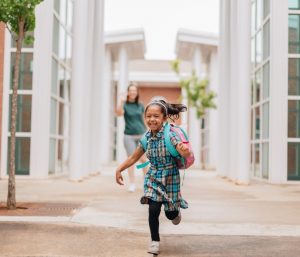9 Ways to Get Your Child Ready for Kindergarten
 Kindergarten brings big changes for kids. For some, it’s their first time in a structured school setting. For others, it’s going from a small classroom in preschool to a big room with lots of kids. Here are nine ways to make the transition easier.
Kindergarten brings big changes for kids. For some, it’s their first time in a structured school setting. For others, it’s going from a small classroom in preschool to a big room with lots of kids. Here are nine ways to make the transition easier.
1. Practice kindergarten skills.
Over the summer, practice activities your child will be doing in class, like forming letters and holding a pencil. It’s fine if your child hasn’t mastered these skills when school starts. But it can ease stress for your child—and help the teacher—if the kindergarten classroom isn’t the first place your child tries these tasks.
2. Set clear bedtime and morning routines.
Depending on your morning schedule, it may help to move bedtime to an earlier time. Before school starts, run through the morning routine with your child, too. Practice having your child wake up on time, get dressed, and eat breakfast.
3. Start phasing out nap time.
Many kindergarten classes have rest time. But if your child still takes naps, this break will probably be shorter than the naps your child is used to. Start cutting the length of nap time by a couple of minutes a day before school starts.
4. Make following directions fun.
Kids in kindergarten are expected to follow directions throughout the school day. Practice this at home in fun ways. Have your child do activities with one- and two-step directions before school starts.
5. Ask how your child is feeling.
Kindergarten is different from other grades because there are a lot of firsts. It’s a big unknown that can make kids feel anxious. Help your child get through the first-day jitters —and bigger worries—by talking. Ask things like, “What do you want to know about kindergarten?” Or, “You seem a little nervous. What are you thinking about?”
6. Practice asking for help.
Your child may be nervous about needing help at school. That might be with personal things like going to the bathroom independently or getting ready to leave at the end of the day.
Explain that the teacher is always there to help if there’s a problem—and that it’s OK to ask.
7. Read together.
Kindergarten is a place for lots of play. But your child will also be learning the basics in subjects like reading, writing, and math. Reading to your child as often as possible helps lay the foundation for kindergarten learning. It also helps prepare kids for listening time in the classroom.
8. Introduce new friends.
Arrange for your child to play with kids in the same grade, or even the same class, if you can get the class list ahead of time. Try to branch out beyond kids your child already knows from preschool or the neighborhood.
9. Remind your child of strengths.
Some kids worry about not being “good enough” at doing things. Explain that kindergarten is all about trying new things and working to get better at old things.
The transition to kindergarten can take a little while, and there may be ups and downs. But a little preparation can make a big difference in how your child feels about starting school.
Excerpted from “9 Ways to Get Your Child Ready for Kindergarten” from Understood. Read the full article online.
Source: Understood | 9 Ways to Get Your Child Ready for Kindergarten, https://www.understood.org/articles/en/how-to-get-ready-for-kindergarten | © 2014–2021 UNDERSTOOD.ORG USA LLC
If you have concerns about your child, CHC Care Coordinators can arrange a free 30-minute consultation so you can explore options with an expert. We invite you to call or email us at 650.688.3625 or careteam@chconline.org to set up an initial Parent Consultation appointment. CHC teletherapy services are available now.




